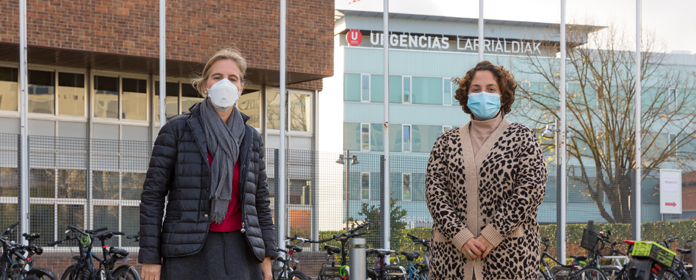"The first wave taught all health professionals that it is vital to anticipate".
The School of Nursing of the University of Navarra organizes the online course "management Nursing in times of crisis" with two experts from CHN and CUN.

PHOTO: Manuel Castells
In the opinion of Nerea Elizondo, Deputy Director of Care at the Navarra Hospital Complex, "healthcare professionals have learned something very important from the first wave that is already being applied in this second: we must anticipate. We cannot allow the advance of the pandemic to catch us unawares". She, along with Beatriz Paloma - director of the area Hospitalization Department of the Clínica Universidad de Navarra- participated on Thursday, November 19, in the online session "management nursing in times of crisis", organized by the School of Nursing of the University of Navarra.
The course was addressed especially to group of nursing professionals and students. Both experts addressed the main challenges they have faced in the field of nursing management in times of crisis, such as the one caused by the coronavirus.
In this regard, the two managers agree that they have never experienced a status as serious as the current one, which, however, has made it easier for Nursing to participate, from the beginning, in decision-making together with the other healthcare disciplines and the management teams of the hospitals themselves: "Being present in this area is an opportunity to make the efforts of our professionals visible, to communicate their needs and to propose the changes that are required", considers the manager of area of the CUN Hospitalization Department.
In his case, he stresses the wisdom of the creation, from the beginning of the pandemic, of a committee COVID together with the management to set the strategy and measures to be followed. "Middle management and professionals are demanding greater participation in decision-making. That is why, in my opinion, the great challenges at the level of management nursing lie in achieving proximity with the teams, achieving a work multidisciplinary with them and doing so through continuous communication," adds the CUN specialist.
"There has been no summer break."Regarding the way in which the healthcare teams have adapted to the COVID crisis, the Deputy Director of Care at the Navarra Hospital Complex stresses that the services of the healthcare centers have at all times been up to the task: "Although the population has perceived a certain summer relaxation, the management posts have been, and continue to be, in a continuous process of review, adaptation and update of protocols. Decision-making is daily and constantly tries to adjust to both the actual status of the pandemic and to the forecasts, in search of the most efficient and effective balance possible".
With regard to the level of stress and fatigue of the professionals themselves, both experts also agree that there is a lot of accumulated tension: "Human capital is the great asset of healthcare organizations, so it is vital to take care of it. Especially at times of increased activity and healthcare pressure," says Nerea Elizondo. "The staff most involved in COVID (emergency, hospitalization, ICU and support teams) is the one that has received and receives the most pressure. At CUN we try to think of creative solutions, and we try to keep the supervisory teams - who are the ones on the front line in the battle - strong and motivated. And to be honest, it is very gratifying to see how, despite the protective suits and safety measures, the professionals are able to make the patient feel relieved and cared for," concludes the manager of the Clínica Universidad de Navarra.
